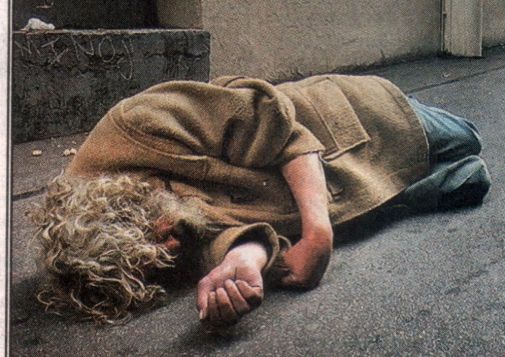Pivot releases report on Vancouver’s low-income housing crisis
Pivot releases report on Vancouver’s low-income housing crisis
Vancouver, B.C., September 21, 2006
Vancouver’s homelessness crisis is about to get a lot worse unless immediate action is taken, according to Pivot Legal Society’s new report, Cracks in the Foundation: Solving the Housing Crisis in Canada’s Poorest Neighbourhood.
“If we continue to lose low-cost housing in the Downtown Eastside at the current rate, we can expect to be coping with at least three times the number of people living on Vancouver’s streets by the time the world arrives for the 2010 Olympics,” states lead report author and lawyer David Eby.
“We can’t afford this kind of increase in homelessness. We are currently spending $51 million dollars per year to maintain people on the street. Government calculations show it would be much less expensive to simply build new supportive housing.”
The report, based on 160 affidavits collected from Downtown Eastside residents in housing crisis and documents obtained through Freedom of Information requests, is the product of 18 months of research and the work of more than 50 volunteers and staff. It documents the looming low-income housing shortage facing Vancouver and shows the shocking conditions of existing low-income housing in the Downtown Eastside.
Linus Malik, a resident of one of the Downtown Eastside hotels, describes the chronic bedbug infestation that plagues so many of the residents. “I have bed bugs in my bed, and other people have told me they have bed bugs too. I told the manager, and they told me it was my problem. They were very rude about it. They own the mattress and box-spring, so I can’t throw it out.”
Despite the grim findings of the report, Eby states there are many opportunities for action. “We could start today by cleaning up instead of closing down low-cost housing. The city has the legal power to go into residential hotels and lodging houses, make the repairs itself and bill the landlord. We need to maintain what we have, and take immediate steps to reach the city’s housing goal of 800 low-income housing units per year.”
The report outlines a number of routes for addressing the housing shortage, such as creating market incentives for developers to incorporate low-income housing into new developments, increasing welfare shelter allowances, and sweeping changes to the Residential Tenancy Act.
About Pivot Legal Society
Pivot’s mandate is to take a strategic approach to social change, using the law to address the root causes that undermine the quality of life of those most on the margins. We believe that everyone, regardless of income, benefits from a healthy and inclusive community where values such as opportunity, respect and equality are strongly rooted in the law.
Contact: David Eby (778) 865-7997 www.pivotlegal.org
Homelessness & 2010 Olympics
“Unhousing the Poor…”, Anti-Poverty Committee Newsletter, Spring 2006
‘With the Olympics on the horizon, housing for people living in Canada’s most unfashionable neighborhood—Vancouver’s [Downtown Eastside]—is under severe threat, just as it was during Expo 86. Various civic bylaws and policies address the issue, but they are not enforced and ignored when they have become inconvenient. They were, for instance, simply put aside when, contrary to bylaw & policy, the former Dunsmuir House was converted over to a student and backpacker’s hostel..
“Meanwhile city police are systematically closing down hotels in the Downtown Eastside, further reducing the available housing. When the hotels are closed down the tenants are simply evicted… Hundreds of people every year are losing access to affordable housing as the Olympics approach, and
the problem will only continue to get worse as the date gets closer and the Olympic tourism feeding frenzy gains momentum.”
“Is your hotel the next to close?” Downtown Eastside Residents Association
Newsletter, January 2007
“In the last year over 14 hotels have been sold for over 40 million dollars.
Many of these buildings, that contained hundreds of rooms, were sold illegally and currently remain empty. There are dozens of hotels that are for sale in the DTES.”
